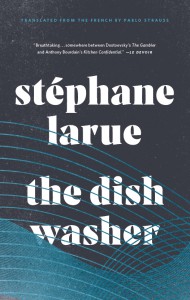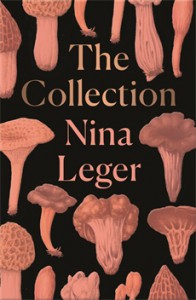This week’s reviews of the newest and most compelling translated literature include the latest work by Poland’s preeminent writer, Olga Tokarczuk, a fascinating portrayal of manic self-interrogation and class by Stéphane Larue, and a darkly dionysian tale of the female gaze by the award-winning Nina Leger. Our editors burrow into the philosophy, language, and atmosphere of these three novels to give you some extra additions to your reading list.

Drive Your Plow Over the Bones of the Dead by Olga Tokarczuk, translated from the Polish by Antonia Lloyd-Jones, Riverhead Books, 2019
Review by Andreea Scridon, Assistant Editor
Janina Duszejko is the kind of woman that many would call “eccentric”: she’s in her mid-sixties, often bordering on paranoia, and she’s firmly convinced by astrology, absolute vegetarianism, and William Blake. In rural Poland, Janina—as she hates to be called—lives peacefully and in relative solitude as a guardian for the summer cabins surrounding her home. However, she quickly comes into conflict with the insensitive and barbarous hunters who reign over the area. The death of a neighbor escalates such tension, creating a series of mysterious murders that Janina will be privy to, and which will culminate in an unexpected twist.
The novel isn’t memorable for being a perfect noir (though one might say that it could be categorized as such, for its “ticking all the boxes”), but rather from its ability to turn the genre on its head by broaching much larger existential, political, and psychological issues. Simply by looking at the table of contents, with chapter titles such as “Testosterone Autism” and “Cucujus Haematodes,” one realizes that Tokarczuk is a baroque author who, as we later come to discover, is sensitive and attentive to detail:
I have always regarded the feet as the most intimate and personal part of our bodies, and not the genitals, not the heart, or even the brain, organs of no great significance that are too highly valued. It is in the feet that all knowledge of Mankind lies hidden; the body sends them a weighty sense of who we really are and how we relate to the earth. It’s in the touch of the earth, at its point of contact with the body that the whole mystery is located—the fact that we’re built of elements of matter, while also being alien to it, separated from it.
Tokarczuk is indulgent in her use of idiosyncrasy, comfortable with unattractive characters and eclectic assortments, and takes her time pacing a work that strikes the reader as both niche and approachable at the same time. There is no rashness and, despite the book being a thriller, it is also pensive. The psychological emphasis keeps the tension continuously taut: “I could feel my head burning with sudden, anxious thoughts, I could almost see them steaming in the rain.” Tokarczuk’s thought and patience in the creation of her protagonist is evident, as Janina’s character defies the crime genre in her apparent futility and distracted temperament. Yet upon closer inspection, nothing in her character is incidental, and Janina’s narration often surprises the reader with its remarkable subtlety and, at times, its crassness. Indeed, this gives the book a dimension of humane credibility. Sometimes the trope of the sensitive person in the world of insensitive people comes across as overbearing, though this may be understood as deliberate.
Tokarczuk paints Poland as a rightful successor to magic realism, with clouds that “rub their wet bellies against the hills” and a braid described as “ . . . a skinny little pigtail, which looked like a grubby shoelace.” She uses the premise of the book to render a fresco of this rich exterior world:
What sort of creature of God was he, this priest? He had dry, wrinkled skin, and there was a little too much of it everywhere. Apparently he used to be obese, but he’d been cured of it surgically, by letting them remove half his stomach. And now he’d grown very thin, perhaps that was why. I couldn’t help thinking he was entirely made of rice paper, the kind that’s used to make lamp shades. To me he was like an artificial creature, hollow on the inside, and flammable too.
Antonia Lloyd-Jones’s translation is natural and fluid, though evidently the result of great mechanical work. Interestingly, it is also a book about translation, with a head-spinning instance of meta-translation, in which the author provides alternative translations of Blake. That’s English – Polish – English on the translator’s part: no easy feat.
Given the nature of the English language, one gets the impression that the original prose is quite ornate and has been whittled down. Fortunately, Lloyd-Jones manages to preserve a host of unusual words: foehn, sentry, pyknic, reconnoiter, sybaritic, mycelium, bacchanal, as well as the unevenness and oddity of the prose itself.
It’s true that Tokarczuk has benefitted from exceptional marketing, and it’s also true that the topics she examines are in vogue. Beyond this, however, she is profound and unique in a manner similar to that of Margaret Atwood, inspiring her reader to cultivate an inner world in tune with natural surroundings. Although her criticism of the Church has caused uproar in Poland, the novel’s philosophical message, built symphonically and unraveled in a spiral, does not strike one as un-Christian in the grander scheme. To put it simply, the hype is justified. Unexpected and elusive, Tokarczuk is worth reading.
(You can read an extract of Olga Tokarczuk’s Flights here.)

The Dishwasher by Stéphane Larue, translated from the French by Pablo Strauss, Biblioasis, 2019
Review by P.T. Smith, Assistant Editor
In The Dishwasher, Stéphane Larue invests in plot and character. Chapters are paced like restaurant work: there are quiet lulls for you to catch your breath and torrid rushes where nothing stops moving, the type of chaos where the only way to stay on your feet is to wildly tumble forward. Work, bars, booze, drugs, friends, and out-of-body gambling experiences change how time flows. The novel’s distinctiveness is in the voice, its brilliance, layers, and foolishness. People, addiction, and work become compelling. Pablo Strauss’ translation creates a narrator and a world of energy and exhaustion.
The plot this voice propels is thus: a young guy, in Montreal, attending school for graphic design, gets a job as a dishwasher to pay debts. A metal band commission him to design a logo and album cover, his first big break. He’s obsessed with metal, reads horror and science fiction, and is a gambling addict, and he’s about to take all of his tastes and traits with him on a radically deep and terrifyingly rapid dive into the manic lifestyle that is restaurant culture.
Characters are distinct and lively, and leaving out even minor ones would make La Trattoria less vibrantly itself. These people break down, rise up, entertain, manipulate, break others, save others. They come and go. They’re not all likeable all the time; some never are.
The novel opens with a prologue, and this is when we meet Bébert, a main character and a mentor of sorts. He and the narrator go to a bar and catch up, and there are signs that trouble is coming. A foreboding sense of doom dominates The Dishwasher. Trouble is coming for our dishwasher who knows too little; it’s a restaurant noir. Call some lines hard-boiled: “Kind of guy who’s a little too sketchy to really go straight, but too lazy to make it as a real criminal . . . Kind of dude who just kept trying to fend off bad luck by stuffing it away in the back of his closet or under his sink.”
Both within chapters and overall, the structure and pace of plot is masterful. Halfway through, there’s a significant flashback, and it feels subtle. Too many chapters may end on a moment of defeated stillness where an epiphany may occur, but when some are as good as: “I was moving forward, with my hands over my eyes. It would become my signature move,” or: “At 10:20 I left the bar, pockets empty, stunned by the violence of my shame,” it’s an understandable reliance.
The dishwasher is an obsessive observer, and Strauss keeps up with him. Smell is depicted so intensely you want to scratch the paper. Briefly: “We passed Rosemont and I fell asleep, hugging myself, marinating in the smells of burnt olive oil and degreaser.” Or with the sights:
A large garbage can rose in the centre of it all like a sacrificial well, its black bag overflowing with what the lunchtime hordes had rejected, like the entrails of an animal with rumpled, slimy skin. The area smelled like disinfectant and something else I couldn’t put my finger on, a greasy, fetid odour that filled my nostrils.
The world is not just smell, it is sound:
The sizzle of meat, garlic, and onions in the skillet, the sputtering of cooking wine or cream in the hot pan, the growl of hood vents, the order shouted in a mixture of French and English: everything was coming together in a cacophony that would drive you crazy if you spent more than five minutes being mercilessly buffeted around by the cooks.
He watches people, their gestures, their clothes, how they speak. He assesses their age, their social and economic status, because those assessments determine how he fits in, or doesn’t. He details individuals and the dynamics of a group. But being the master observer doesn’t make you a good guy. It can make you an asshole. On a drunken night out, i.e. a night out, they pass two people and he stares. Bébert scolds him, because he knows that trouble can be found in anything.
The dishwasher’s passivity may be his great failure. In the restaurant, he is different, becomes “a fighter,” one of a few false names given him. In his gambling eyes, he sees everything as luck, outside of his control. Any one thing can derail his path, a bad turn ruin the future. Gambling is part of his identity, but identity is a multitude. Work gives an identity, as do friends, music, books, movies, drugs, drink, and gambling. When he returns to campus: “It was like glimpsing the memories of another person, a life completely removed from this sunlit, diurnal existence.” He also sees the multitude in others: “Bonnie in her cook’s outfit and Bonnie in her jeans full of holes were two distinct, twin creatures inhabiting parallel universes.”
The distance between the young dishwasher and the older version of himself who is narrating is subtle and brilliant. Larue and Strauss massage the narrative, so we are nearly always experiencing events as immediate, but we must remember, and are occasionally reminded, of the perspective of time. The Dishwasher is a masculine, aggressive book. There are fights, verbal and physical. There is hero worship. Layered over this, the older, wiser voice shows the damage of all that, without simple condemnation.
This layering makes the narrator trustworthy, even though the dishwasher is a liar. He lies compulsively. He lies because he’s afraid of losing people. He lies: “Usually I had a facility for self-delusion, and no compunction about lying to myself. Today I felt totally empty and exposed.” The older narrator is wiser, honest, and he sees the good and the bad in these people who his younger self saw with anger, pity, awe, lust, and desperation, himself included.
This is a highly intelligent book, different than most books given that label. It’s not experimental, nor is it philosophy mixed with fiction. It’s smart because of what it says about people, how it says it. It’s a rare book where physical labor exists and office jobs don’t, where class exists. It’s a book that succeeds on its own terms. These things it does, it does incredibly well.

The Collection by Nina Leger, translated from the French by Laura Francis, Granta Books, 2019
Review by Rachael Pennington, Assistant Managing Editor
The Collection, which won Nina Leger the Anaïs Nin Prize, narrates the story of one woman’s sexual encounters in the anonymous hotel rooms of Paris. As only voyeurs to her fantasies and appointments, the little we learn of Jeanne revolves around her objectification of the male body. With an obsession that started with her staring at a man’s crotch on a busy metro ride one morning, The Collection invites us to consider the influence and control of the female gaze.
Jeanne is the creator of the “memory palace”: a space inside her mind she has built with great care and attention to house the male genitalia she collects. The estate requires constant maintenance and renovation, and she regularly frequents the streets and metro lines of the French capital to gather new additions from men whose names she prefers not to know. In their meetings, small talk is avoided; she does not etch their faces onto her mind; there are no first-date nerves, no throes of passion, no sparks of lust mistaken for love. The only attribute of theirs she is concerned with is their penis, the details of which she memorises for own personal collection:
“She closes her eyes and goes slowly through the memory palace, whose floors feel downy. Black skin, dark veins, light, supple testicles, red hairs, glans a purplish blue as through bruised, flushed penis; penis hunched up on itself like a burrowing animal; blurred penis, tortured outline [. . .]”
The novel is separated into snapshots of moments in Jeanne’s sex life that blur the lines between her fantasies and her reality. Resembling fragments of prose poetry, the narrative and its translation is direct, observant and sensual: from descriptions of Paris—with windows that “glisten” and leaves with noticeable “white veins”—to descriptions of Jeanne herself, whose presence on the city’s metro network is almost ghost-like: “. . . she floats in the dense perfume of her neighbour; reflections dance on the window of the carriage, the moon is blurred and misty.”
In her translation from the French, Laura Francis eloquently selects each word to capture the fluidity with which the narrative loses and gains form. The result on the page is stylistically pleasing, yet we can’t help but want more. With no more almost-glimpses of Jeanne in hotel mirrors and sex shop windows, Jeanne could be anyone and no one.
In this way, the author sweeps aside plot, chronological order, and character to make room for conjecture. She opens the discussion as to who this anti-heroine could be and we gratefully accept the invitation to speculate on her profession, her likes and dislikes, and the events in her past that led her to her current situation—was she abused as child or neglected by her ex-husband? Or perhaps she has suffered from an eating disorder, or is she simply a nymphomaniac?
This is no ordinary reflection on sex and the spaces in which it occurs and is remembered; as commented in The Guardian’s review of the novel, The Collection is a form of female narrative that marks a difference. Nina Leger mocks the presuppositions surrounding the sexuality of women and dares the reader to challenge the worn-out tropes of female characters. And, in the meantime, unscathed by any judgment that may befall her, Jeanne continues on; she plays out her part, moves from room to room and keeps adding to her collection.
*****
Read more reviews on the Asymptote blog:

